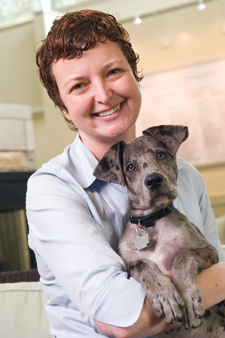 Rochelle Michalek '02
Rochelle Michalek '02
Adopting smart business strategies to save animals' lives
By Rachel Farrell
One afternoon in December 2004, Rochelle Michalek ’02 was writing checks to her favorite animal shelters — as she routinely did during the holidays — when she paused, turned to a friend and made a vow.
“One day,” she said, “I’ll do more than just make a donation.”
As it turned out, Michalek, then an executive at Motorola, discovered an opportunity to “do more” only four months later. One of the shelters where she volunteered, PAWS Chicago (Pets Are Worth Saving), was looking for a director of operations. Michalek eagerly applied for the position.
Michalek landed the job, but not just because she had a passion for dogs and cats. It was Michalek’s business skills — honed through 20 years in the corporate world and through the Kellogg School’s Executive MBA Program — that made her the right person for that role and ultimately that of executive director. “[PAWS founder] Paula Fasseas always says, ‘I hire business people, because they know how to make one plus one equal 1,000,’” explains Michalek, who was named to PAWS’ top post in 2007.
Indeed, PAWS Chicago runs itself more like a for-profit business than a nonprofit organization. Since its inception in 1997, the organization has attacked the problem of pet homelessness through a three-fold approach: developing sustainable, solution-based programs; adopting smart and transparent financial and business practices; and engaging, empowering and partnering with the community — all while committing itself to “No-Kill” practices, meaning that it will not manage pet overpopulation by euthanizing homeless pets.
To address the surplus of stray dogs and cats, PAWS Chicago offers free or donor-subsidized spay/neuter surgeries at the Lurie Spay/Neuter Clinic. Located in the Little Village neighborhood, the clinic is accessible to the underserved areas of Chicago where a large percentage of unwanted pets originate. This year, the clinic has performed approximately 100,000 spay/neuter surgeries, 65 percent of which have been free.
PAWS Chicago operations are 70 percent volunteer-supported (each year, volunteers donate more than 78,000 hours), which keeps the organization’s costs down while ensuring that community members are engaged in the cause. PAWS is 100-percent funded by private donations and has consistently received a four-star rating from Charity Navigator for its efficient use of resources.
To encourage more people to adopt shelter animals, PAWS Chicago has built an upscale, state-of-the-art adoption facility in Lincoln Park that houses dogs and cats in individual suites (as opposed to cages) and offers a variety of educational resources for new pet owners. Since opening the center in 2007, PAWS Chicago has found homes for more than 10,000 cats and dogs, the vast majority of which originated from Chicago’s city pound.
“The PAWS business model [stems from] innovative and entrepreneurial thinking, while having financial, operational and business goals that yield results,” explains Michalek. “We are always asking ourselves, ‘How can we creatively and proactively solve this problem? How can we do more with less? How can we save more lives?’”
PAWS Chicago’s ultimate goals are to make Chicago a No-Kill city, eliminate pet homelessness in Chicago and create a shelter model that can be replicated nationwide. The organization is well on its way: When PAWS was founded in 1997, about 44,000 animals were euthanized in Chicago each year. Today, that number has dropped below 19,000. Media coverage of PAWS — most notably a feature on the “Oprah” show last year — has also brought national attention to the organization and driven more than 300 shelters to contact PAWS Chicago for information on their best practices. In addition, under Michalek’s direction, PAWS adoptions and spay/neuter services have grown annually from 600 to 4,000 and 7,000 to 17,000, respectively, in the past five years.
Those numbers are what drive and motivate Michalek, who grew up in a house full of stray pets and now has four cats and a Siberian Husky mix named Malamar.
“Animals are voiceless,” she says. “Someone needs to be their voice and advocate.”


